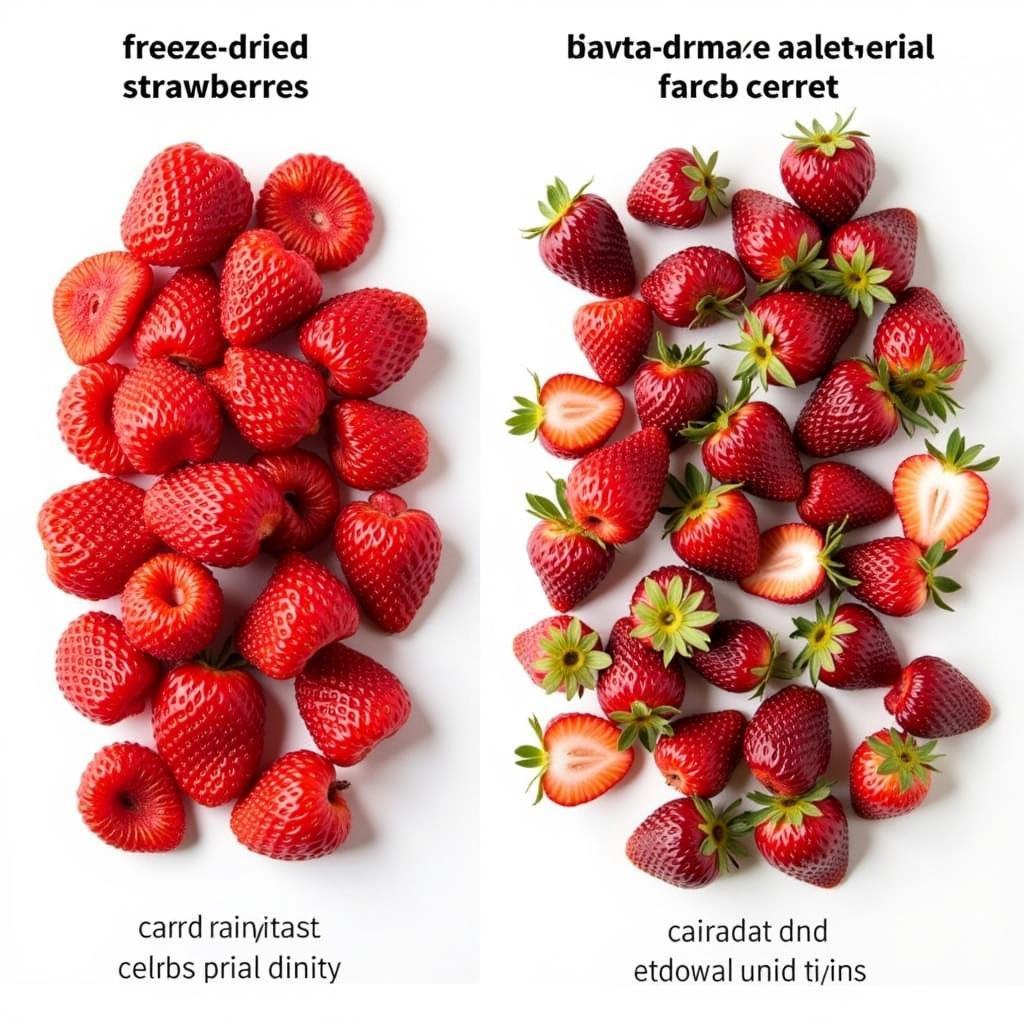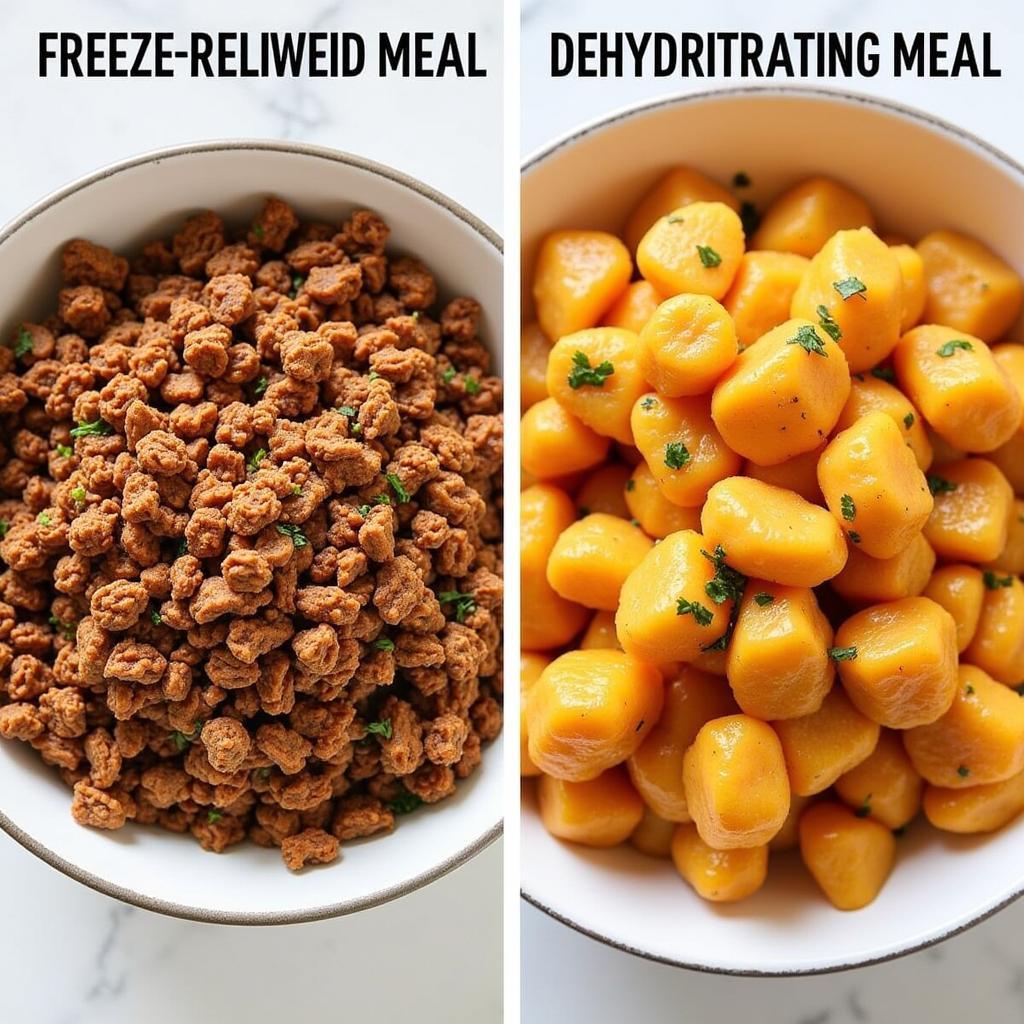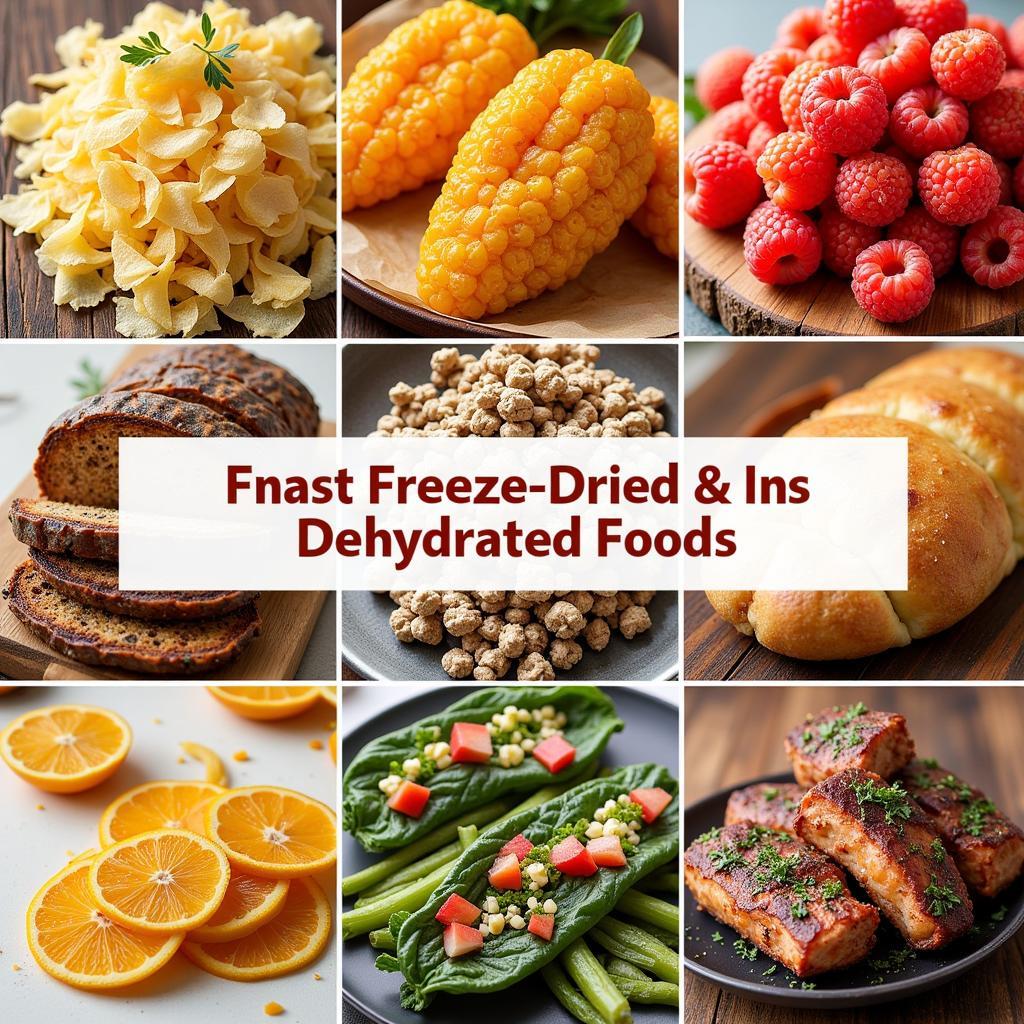Freeze Dried Food Vs Dehydrated: what’s the difference? Both methods preserve food by removing water, but the processes, and the end results, are quite distinct. This guide delves into the nuances of each, helping you decide which method best suits your needs. For a quick comparison between these two preservation methods, check out our dedicated article freeze dried food vs dehydrated food.
Understanding Dehydration
Dehydration is the oldest method of food preservation, relying on low heat and airflow to remove moisture. Think sun-dried tomatoes or jerky. Modern dehydrators speed up the process, but the principle remains the same: slowly evaporate the water content. This results in a smaller, lighter product, perfect for backpacking and camping. However, the heat used in dehydration can affect the food’s nutritional value and flavor.
How Dehydration Works
The dehydrator circulates warm air around the food, drawing out moisture. This process can take several hours, depending on the food type and the dehydrator’s efficiency. The end product is often chewy or leathery, with a concentrated flavor.
Benefits of Dehydrated Food
- Affordable: Dehydrators are relatively inexpensive, and the process is energy-efficient.
- Easy to store: Dehydrated food takes up less space and weight than fresh food.
- Long shelf life: Properly stored, dehydrated food can last for months or even years.
Exploring Freeze Drying
Freeze drying, also known as lyophilization, is a more sophisticated method. It involves freezing the food, then lowering the pressure and adding heat to sublimate the ice directly into vapor, bypassing the liquid phase. This process preserves the food’s shape, texture, and nutritional value much better than dehydration.
The Science Behind Freeze Drying
The freeze drying process occurs in three stages: freezing, primary drying (sublimation), and secondary drying (desorption). This meticulous approach minimizes damage to the cell structure, resulting in a product that rehydrates quickly and retains its original flavor and nutrients.
Advantages of Freeze Dried Food
- Superior nutritional value: Freeze drying retains more vitamins and minerals compared to dehydration.
- Excellent flavor and texture: Freeze-dried food closely resembles its fresh counterpart after rehydration.
- Longer shelf life: Freeze-dried food can last for decades when stored properly. If you’re interested in the differences in pet food preservation, have a look at our article dehydrated vs freeze dried dog food.
 Freeze Dried vs Dehydrated Strawberries Comparison
Freeze Dried vs Dehydrated Strawberries Comparison
Freeze Dried Food vs Dehydrated: A Head-to-Head Comparison
To better understand the key differences, let’s compare freeze-dried and dehydrated food across several factors:
| Feature | Freeze Dried | Dehydrated |
|---|---|---|
| Process | Freezing, sublimation, desorption | Air drying with low heat |
| Cost | Higher | Lower |
| Nutritional Value | Higher | Lower |
| Flavor | Excellent | Good, but can be altered |
| Texture | Retains original texture | Chewy, leathery |
| Shelf Life | Longer (decades) | Shorter (months to years) |
| Rehydration | Quick and easy | Slower, may not fully rehydrate |
Which Method is Right for You?
Choosing between freeze-dried and dehydrated food depends on your priorities. If budget is a primary concern, dehydration is a great option. For the best quality and longest shelf life, especially if you’re looking at best camping freeze dried food, freeze-dried is the way to go.
 Comparison of Freeze-Dried and Dehydrated Backpacking Meals
Comparison of Freeze-Dried and Dehydrated Backpacking Meals
“Freeze-drying is an investment in quality. While the upfront cost is higher, the superior nutritional value, flavor, and extended shelf life make it worthwhile for serious adventurers and preppers.” – Dr. Amelia Carter, Food Scientist
What is freeze-drying best for?
Freeze-drying excels at preserving fruits, vegetables, and even complete meals, retaining their original qualities exceptionally well. Check out our article on dehydrated vs freeze dried food for more detailed information.
What is dehydration best for?
Dehydration is a cost-effective choice for preserving fruits like apples and bananas, or for making jerky, where a chewy texture is desired. If you’re considering building your own dehydrator or need replacement components, visit our parts for food dehydrator page.
“For everyday use and simple food preservation, dehydration is a practical and affordable solution.” – Chef Michael Riley, Culinary Instructor
 Variety of Freeze-Dried and Dehydrated Foods
Variety of Freeze-Dried and Dehydrated Foods
Conclusion
Freeze dried food vs dehydrated – both offer effective ways to preserve food, but the best choice depends on your individual needs and preferences. Consider your budget, desired shelf life, and the importance of flavor and nutritional value when making your decision.
FAQ
-
How long does freeze-dried food last? Freeze-dried food can last up to 25 years or more if stored correctly.
-
Is freeze-dried food healthy? Yes, freeze-drying retains most of the food’s original nutritional value.
-
How do I rehydrate freeze-dried food? Simply add water, wait a few minutes, and enjoy!
-
Is dehydrated food as good as freeze-dried? Dehydrated food offers a good shelf life and cost savings but doesn’t retain as much nutritional value or have as appealing a texture as freeze-dried food.
-
Can I dehydrate food at home? Yes, using a dehydrator or even your oven.
-
What are the benefits of freeze-drying over canning? Freeze-drying retains more nutrients and flavor than canning.
-
Is freeze-dried food expensive? It is more expensive than dehydrated food but offers superior quality.
Need help deciding which food preservation method suits your needs? Contact us at Phone: 02437655121, Email: [email protected] or visit us at 3PGH+8R9, ĐT70A, thôn Trung, Bắc Từ Liêm, Hà Nội, Việt Nam. We have a 24/7 customer support team.